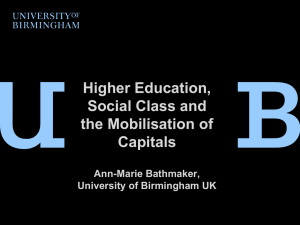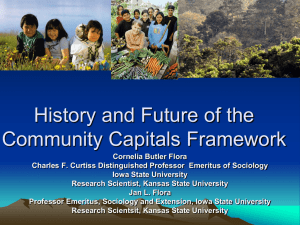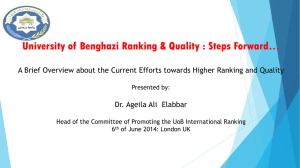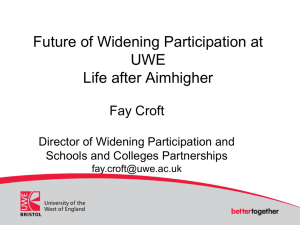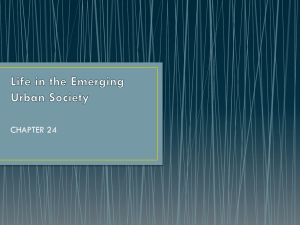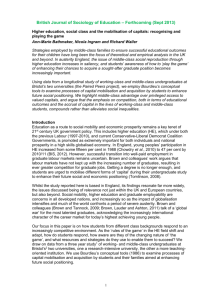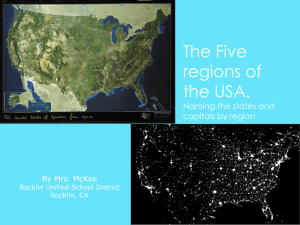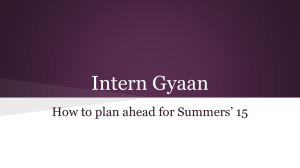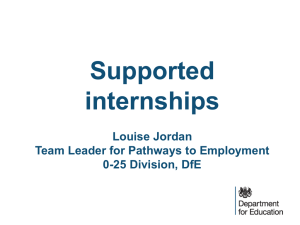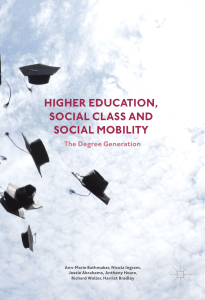Higher Education, Social Class and the Mobilisation of Capitals
advertisement
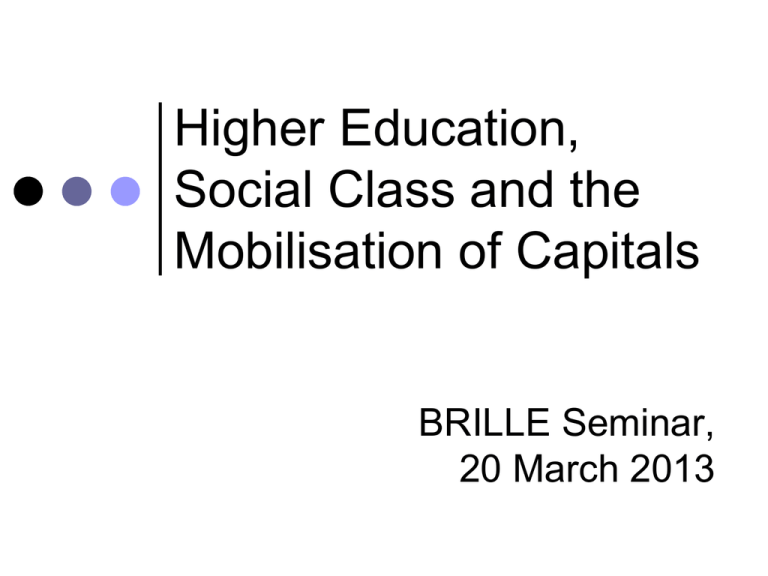
Higher Education, Social Class and the Mobilisation of Capitals BRILLE Seminar, 20 March 2013 Dr Richard Waller (UWE, Bristol), Dr Nicola Ingram (University of Bath) Prof Ann-Marie Bathmaker (University of Birmingham), 2 3 Overview 4 The Paired Peers Project Changing graduate recruitment markets: the opportunity trap Playing the ‘game’: using Bourdieu’s conceptual tools to examine processes of capital accumulation Knowing ‘what the game is’ Generating capitals through extra-curricular activities (ECAs) Generating capitals through internships Conclusions The Paired Peers project Longitudinal study of students through undergraduate degree in England (2010-2013) Aims and objectives: To compare systematically the experiences of pairs of students from different social classes, studying the same subjects at two universities in the English same city 1: The traditional 'elite' University of Bristol (UoB) 2: The 'new' more teaching-focused University of the West of England (UWE). To identify the various kinds of capital students from different classes brought into their university experience (economic, social, cultural etc), and to explore the various types of capital they acquired over the three years. To examine differing processes of capital mobilisation and acquisition by students that may enhance future social positioning. 5 The opportunity trap Phil Brown and colleagues challenge the notion of a straightforward ‘graduate premium’ Instead a ‘global war for talent’ 6 The war for talent in changing graduate recruitment markets 7 Need for ‘positional advantage’ within the graduate recruitment market ‘(W)hile we can all be encouraged to do our best, we cannot all be the best’ (Brown 2003:144). ‘cashing in one’s opportunities requires access to scarce credentials, jobs and networks’ (Brown 2003: 150). ‘Ranking tournaments’ social structures of competition for prestigious graduate careers switch in emphasis from meritocracy to market place Cont… Changing recruitment criteria (Brown and Hesketh 2004) paper qualifications just the preliminary stage first class degree from a first class university, and a first class CV and ‘soft skills’ as well. Increasing emphasis on ‘soft’ skills at the expense of ‘technical’ ones (Grugulis and Vincent (2009) - ‘‘good’ employees display the ‘right’ skills in acceptable and accepted ways’ (2009:600). 8 Playing the game – using Bourdieu’s conceptual tools 9 The need to acquire and mobilise resources in the form of ‘capitals’ (economic, cultural, social etc) that are valued in a particular ‘field’ of social action Agents are positioned in the field in dominant and dominated positions as a result of the capitals they possess Conscious and unconscious ‘strategising’ by agents in order to position themselves Having a ‘feel’ for the game You can use the analogy of the game in order to say that a set of people take part in a rulebound activity, an activity which, without necessarily being the product of obedience to rules, obeys certain regularities... Whoever wants to win this game, appropriate the stakes, catch the ball… must have a feel for the game, that is, a feel for the necessity and the logic of the game. (Bourdieu 1990: p.64) 10 Knowing ‘what the game is’ Our participants usually demonstrated a clear awareness of ‘the game’ of obtaining a much sought after graduate position. For example Garry: Going back a few years it seemed to be, a degree in anything is you know, but you got a 2:1 was a statement in itself about someone, (but now)…more and more people do go on to higher education and have degrees, whether almost that seems to, perhaps unfairly, water down what a degree is or how it’s regarded. I don’t know. It’s almost like sort of … market forces being a bit like, if there’s more of something that something becomes less valuable, like money in inflation. (Garry: W/C, UoB, History) 11 But it’s not straightforward... I’ve realised that, especially when it comes to university, that where you went is a lot more important than what you did. And there’s people now that are doing…like they’ve got the internships that I’d love and they’re doing sort of Sociology degrees and something like that! (Harvey: W/C, UoB, Economics) 12 Middle-class advantage: knowing how to play the game (which is not the same as knowing what the game is) I’m sure my networking helped as well, I’m absolutely convinced...I have one family member in an investment bank in London who is a distant, distant relative who my dad put me in contact with and said “oh yeah do you know such and such is in…” So I met with him in London, which was a useful contact, and if I’d got to the final stages of the interview process there that probably would have been quite helpful. As regards other contacts…. (I)...worked for my mum and dad’s accountant, for their work...spend a few days with him, whack it on the CV and they think “oh look he’s done some accounting” – tick box. (Nathan: M/C, UoB, Law) 13 Mobilising capitals through extra-curricular activities Sports Leisure societies – debating, reading, photography Political societies Subject societies – philosophy, history, engineering, English 14 Active generation of capitals I’m...carrying on really, trying to do well in academic side of it but also keep up like the sports and stuff, because that’s…so many people have good academic skills and academic qualifications. And also you’re up against pretty much a lot of people from other countries as well, because I always forget it’s not just like English unis. (Francesca: M/C, UWE, Law) 15 Active generation of capitals Assuming positions of responsibility: being on committees becoming secretary of the cheer-leading squad (Harriet, UWE, m/c), Vice President of the Aero Society (Jennifer, UoB, m/c) and president of the English society (Melissa, UoB, w/c). 16 Internalised generation of capitals Jack carries on where his parents left off. What they did: Oh just making sure we’ve got something that we can have for the future, like windsurfing, surfing, trumpet, climbing, I’ve done so many activities when I was little it’s just stupid. And then so now my sister’s now working all round the world doing windsurf teaching and stuff like this, and I’ve taught break dancing and stuff like that. So kind of setting us up for the future rather than just giving us PS3s. (Jack, m/c, UWE) 17 Barriers to the generation of capitals through ECA (1) I love to meet new people so it was a bit disappointing, […] but this year unfortunately I couldn’t really afford to join any societies or anything. But I have been playing football and stuff with my mates just down the local park and stuff […]. (Henry, w/c, UWE) 18 Barriers to the generation of capitals through ECA (2) I physically don’t have time. […] I’d love to get involved but I physically can’t. Which is another frustrating thing then because I feel like I am not making the most out of my time here. (Zoe, w/c, UoB) 19 Engaging in activities unlikely to generate ‘valuable’ capitals … there’s like four of us in my flat especially that get on really well, we just sit in the kitchen, make food together, have a chat. It’s nice to like catch up after like a day, because we all go like our separate ways in the day and then come back. It’s quite like a little family. (Jade, w/c, UoB) 20 Engaging in activities unlikely to generate ‘valuable’ capitals Working-class young men spent time playing X-box Sariah (w/c female, UWE) explained that she spent her time ‘going out clubbing and stuff and, you know, shopping, every girl likes to shop.’ 21 Generating Capitals through Internships Students’ attitudes to internships awareness of the increasingly competitive nature of the graduate employment market and the limited opportunities in a period of financial recession intensification of commitment to acquire as many ‘extras’ as possible whilst completing their studies Most participants had, by the end of second year, secured (or were actively pursuing) an internship relating to their future aspirations, regardless of social class or institution However differences emerged in the types of internships gained and the success of their applications. For some working-class students, the importance of internships needed to be made explicit, as Isabel’s comments illustrate: I need to start volunteer work pretty soon or some sort of work experience, ‘cos they’ve been drilling it into us from the start that like it’s all well and good that you’ve got qualifications, but employers are looking for something else now because everyone’s got the same qualifications, like there’s going to be however many of us, hundreds of us graduating with this degree, we need something to make us stand out. (Isabel, working-class, UWE) 23 For other middle-class students being competitive might be better read as their taken-for-granted dispositions towards university and career advancement. Everyone has A’s at GCSEs, you’ve just got to try and differentiate yourself by doing something extra like Investment Society, or an internship, or do mooting in my spare time. Because you see some of these people particularly if you want to become a barrister it’s ridiculous, you see these people who, you know, run a soup kitchen in their spare time, got a First Class Honours in their degree, been to Africa and saved a school from famine, you know, it’s absolutely ridiculous how much they have. So you’ve got to try and aim for that or try to match it, try and build up your CV because it’s so competitive. (Nathan, middle-class, UoB) 24 Active and internalised mobilisation of capitals Middle-class students in both institutions were more successful than their working-class counterparts in gaining access to internships, particularly in high status areas such as law or banking, Even though many working-class students had clear internship goals and were achieving top grades on their courses. Largely this was down to middle-class social capital advantage. While working-class students were unlikely to have contacts in big companies to help them, middle-class students could frequently draw on significant connections to secure the best internships. It was striking how the social capital most often employed was firmly embedded in family networks, as the following two examples show: 25 It’s a case of who you know not what you know in some cases. So I am trying to pull in any family ties...like my dad’s quite friendly with one of the traders at (bank name)...he was head of the internship scheme...(and) my mum’s a governor at my old school and one of the governors was a trader at (bank name), so I am trying to pull some strings there (too). (Dylan, middle-class, UWE) My dad’s quite high up in engineering so like advises the government, so a lot of people owe him a lot of favours around the country...(or)...if everything doesn’t go well this summer, I can pretty much go to France and study in Lyon for a couple of months, because people owe him a lot of favours (there). (Nicholas, middle-class, UWE) 26 While some students actively mobilised available capital to secure internships, others simply took such advantages for granted. 27 Well I guess this interview I had over Easter was through a family friend who is the partner of the firm so hopefully that would help...Saying that, my previous work experience last summer was...through one of my dad’s contacts...so I guess there’s always the chance (of finding)...something through them. Well my dad worked for the BBC, but...I don’t know, actually...he does do a job every year. He runs a conference, oh no, streams a conference...so...he might get me a job there this time in the kind of PR, just doing press releases all the time, which would be tedious and quite hard work, but it’s only for a week and it’s in Abu Dhabi so... Barriers to Internships Many working-class students did not have access to the same resources as their middleclass counterparts. Their families simply did not have the connections to draw upon in order to offer advantages in the competitive world of student internships. The following examples contrast starkly with the examples of pulling strings and pulling-in favours 28 I find it so weird when people have parents that are lawyers or doctors and they can get you work experience in a hospital or….I just think “that’s crazy” that’s like something I’ve never experienced. Because my parents do just ordinary jobs. I don’t know how they would help me. I don’t think they would be able to. (Anna, working-class, UoB) It’s not that they won’t give me help, my parents are the most helpful people I could ever imagine. It’s just I don’t know whether they’ve got the skills to be able to find me what I want, because I know what I’m looking for, it’s not really a “them” sort of thing. (Zoe, workingclass, UoB) 29 Conclusions Both working-class and middle-class students in this study were aware of arguments that a degree is no longer enough, and that to gain positional advantage in the graduate recruitment ‘game’, they would need to mobilise additional capitals that might be gained through a variety of activities beyond their formal curriculum. However, awareness of the limited value of a degree (in terms of future employment) was not the same as having a ‘feel for the game’ of constructing employable selves. Using Bourdieu’s tools to understand these activities as contributing to a particular game, where the mobilisation and generation of different forms of capital allows players to gain advantage for their future transition to graduate labour markets, has allowed us to consider the processes by which advantage may accrue during the course of undergraduate study. There is potential for classed advantages in ‘playing the game’, even without any conscious or active strategising. 30 Further information Visit our website: www.bristol.ac.uk/pairedpeers Or email us: richard.waller@uwe.ac.uk n.ingram@bath.ac.uk This paper will be in BJSE in Sept 2013 31
